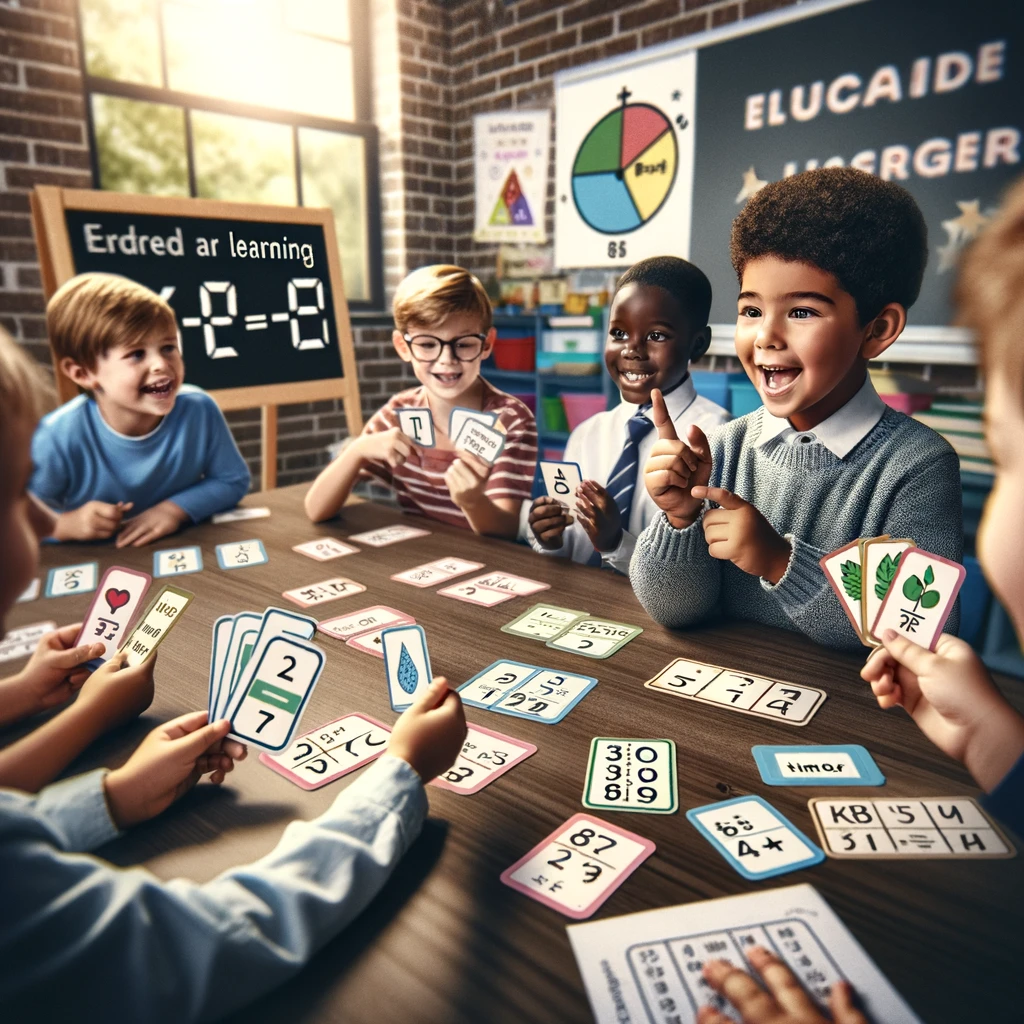
Setting Kids Up for Success: How to Foster a Positive Learning Environment
Ever find yourself at the end of your rope trying to get your kids to do their homework or chores without constant nagging and yelling? As a parent, it’s frustrating when your good intentions to help your child develop positive habits and skills turn into a daily battle of wills. The truth is, there are some simple strategies you can put in place to set your kids up for success and make your life as a parent a whole lot easier. Rather than repeating yourself or threatening consequences to get them in line, try taking a step back and looking at the bigger picture. By making a few small changes, you can foster an environment where your kids feel motivated and empowered to build positive learning habits on their own. Who knows, you might even find dinnertime debates over math problems or chores getting done without being asked. Creating the right conditions for your kids to thrive will help set them on a path to becoming independent, lifelong learners.
Understanding Your Child’s Learning Style
Every kid is unique, with their own way of understanding the world. Some thrive with visuals, others need to move around, and some learn best by listening. Recognizing how your child absorbs and processes information can help make studying more effective and even fun.
Visual learners benefit from colorful charts, diagrams, photos, and videos. They tend to think in pictures and images. Encourage your visual learner to illustrate concepts, create mind maps, and watch educational videos.

Auditory learners prefer listening and discussing. They learn well from lectures, podcasts, audio books, and explaining ideas out loud. Recommend that your auditory learner records themselves reading notes aloud, participates in study groups, and teaches new topics to others.
Kinesthetic or “hands-on” learners need to physically engage with materials to understand them. They learn through movement, exploration, and real-world examples. Suggest that your kinesthetic learner builds models, does experiments, acts out stories or concepts, and takes frequent breaks to move around.
Understanding how your child learns best allows you to choose study methods tailored to their needs. Mix up techniques to keep them engaged – a visual diagram here, an engaging podcast there. Provide opportunities for your child to learn in the way that suits them, and you’ll set them up for success.
Creating an Organized and Engaging Study Space
Creating an Organized and Engaging Study Space
To set your kids up for success, provide them with an organized and engaging study space. This means:
- A quiet, distraction-free area. Minimize noise and limit access to electronics like TVs, phones and gaming consoles. Their study space should be a place dedicated to focused work.
- Ample lighting. Ensure there is plenty of natural light during the day and additional task lighting as needed. Proper lighting reduces eye strain and makes studying more pleasant.
- A comfortable workspace. Provide a sturdy desk or table and an ergonomic chair suited to your child’s height. Make sure there is enough space for books, papers, pens, and a laptop if needed.
- All supplies within easy reach. Place everything your child needs to study – books, notebooks, pencils, calculators, etc. – within arm’s length of their workspace. This minimizes frustration and time wasted searching for materials.
- An inspiring learning environment. Decorate the space with educational posters or artwork depicting your child’s interests like science, history or nature. This stimulating environment fosters a positive attitude toward studying.
- Opportunities for movement. For younger kids or kinesthetic learners, provide an outlet for movement such as an exercise ball to sit on, tactile manipulatives like cubes or blocks, or opportunities for short movement breaks. Sitting still for long periods can be challenging for some children.

Creating the right study space is key to helping kids develop good habits and an enjoyment of learning. Provide them with a tailored environment suited to their needs, learning styles and interests. Their study space should be a place where they feel motivated to achieve and capable of focus. With your support and the proper set-up, they’ll be setting themselves up for success.
Setting Realistic Goals and Expectations
As a parent, setting appropriate goals and expectations for your child’s studying is key. Start by understanding their abilities and learning pace to determine realistic objectives. Don’t compare them to others or push them beyond what they can handle.
Set small, achievable goals to keep them motivated. For example, if they struggle with focusing for long periods, aim for 30 minutes of studying at a time with short breaks in between. Celebrate their wins, no matter how small. Offer praise for their efforts and perseverance, not just outcomes or grades. This positive reinforcement will encourage them to keep working hard.
Discuss their goals and expectations openly. Explain why certain objectives are important and how they can achieve them. Be flexible—some days they may not meet all goals due to challenges with schoolwork or motivation. Re-evaluate and make adjustments as needed. The key is maintaining balance and a supportive environment.
Provide resources and strategies to help them succeed, like:
- A dedicated study space free of distractions
- Interesting books or interactive apps on challenging topics
- Flashcards for memorization
- Rewards for milestones achieved (e.g. pick out a book together)
Most of all, offer your time, patience and understanding. Be there for them when they struggle or feel discouraged. Your emotional support can make a world of difference in their journey to become independent, lifelong learners.
Setting realistic goals and expectations, providing the right resources and maintaining an open, supportive environment are the keys to encouraging kids to develop effective study habits from an early age. With your guidance, they will build the confidence and skills to thrive academically and beyond.
Making Learning Fun Through Games and Activities
Making studying fun for kids is key to helping them develop a lifelong love of learning. One of the best ways to do this is through educational games and activities. These techniques engage children’s minds in an enjoyable way, rather than just passively reading or listening.

Board games
Classic board games like Scrabble, Boggle, and Bananagrams help build vocabulary and spelling skills in a fun, low-pressure way. Strategy games that require logic and critical thinking, such as chess or mancala, are also beneficial for developing young minds.
Online interactive learning platforms
Websites and apps like Prodigy Game, DragonBox, and Duolingo turn math, algebra, and language learning into an adventure. These platforms use challenges, quests, and rewards to motivate kids to achieve the next level. The lessons are short but progressive, so kids can advance at their own pace.
Science experiments
For kids interested in science, experiments and DIY projects are an exciting way to learn. Things like robotics kits, electronics sets, gardening supplies, and chemistry sets provide an opportunity for hands-on discovery of how the world works. Always supervise children and follow instructions carefully for their safety.
Flashcards
While flashcards may seem old-school, they remain an effective memorization technique, especially for younger children. Make your own flashcards or download an app. Turn it into a game by timing responses or using a reward system for correct answers. Flashcards are ideal for learning math facts, spelling, vocabulary, and foreign languages.

Field trips
For a fun change of scenery, take your child on field trips to interactive museums, science centres, historical sites, and educational workshops in your area. Experiencing how things work in real life brings learning to life in a way books alone cannot. Look for kid-focused programs and events to make these outings exciting adventures rather than boring lectures.
Using a variety of these engaging and interactive techniques will motivate your child to want to learn for the joy of it. While grades and test scores are important, fostering a genuine curiosity about the world will serve them well beyond any single class or assignment. Make studying an adventure, not a chore!
The Power of Positive Reinforcement
Positive reinforcement is one of the most powerful tools for encouraging your kids to study. Rather than scolding or punishing them when they don’t want to study, praise their efforts and progress. Give them rewards, both verbal and tangible, to strengthen the positive association with studying.
Offer praise for small milestones, not just end results. Say things like:
- “I’m proud of you for sticking with that difficult math problem.”
- “Great work organizing your time to finish your science project early!”
- “I appreciate you turning off the TV to get started on your homework right away.”

Rewards don’t have to be big or expensive. Things like choosing a fun activity after studying, picking out a book to read together or even just giving your child a hug can go a long way. The key is to give the reward promptly after they’ve studied to strengthen the connection in their mind.
Break down long study sessions into manageable chunks. The Pomodoro Technique, studying for 25 minutes and then taking a 5 minute break, works great for kids. This makes studying seem more achievable and less overwhelming, and the breaks prevent mental fatigue. Let your child choose a fun activity for their breaks like playing outside, doing an art project or playing with Legos.
Group study can transform studying from a chore into a social activity. Have your child invite friends over to study together. They can quiz each other, share notes, work through challenging problems together, and keep each other accountable. Make snacks and drinks available to keep the group fueled, but set ground rules ahead of time to minimize distractions.
Look for ways to bring your child’s interests and hobbies into studying. If they love animals, find books about animals to read together. Are they interested in robotics? Try building models or doing experiments together. The possibilities are endless. Associating studying with enjoyment will motivate your child to do more of it.
Reinforcing the learning process rather than just grades or test scores helps build a lifelong love of learning in your child. While good grades are important, emphasize understanding concepts and taking an interest in new subjects. Help your child pursue knowledge for its own sake. Curiosity is the fuel that powers the desire to study and achieve. Fan the flames of your child’s curiosity and they’ll eagerly study without being told.
Helping Your Child Overcome Academic Challenges
When your child faces difficulties in their studies, it’s important to provide support and guidance to help them overcome these challenges. Rather than scolding or punishing them for struggling, focus on understanding the underlying issues and finding solutions.
Recognize Their Learning Style
Every child learns differently. Some are visual learners, others learn by listening, and some need to physically engage with concepts to understand them. Observe how your child grasps new ideas best and incorporate these techniques into their studying. For visual learners, use diagrams, charts, and videos. Auditory learners may benefit from listening to educational podcasts. Kinesthetic learners can act out or model what they’re learning. Adapting to their learning style will make studying more effective and enjoyable.
Create a Positive Learning Environment
Ensure your child has a dedicated space for studying that is free from distractions. Make it a comfortable area with good lighting where they can spread out their materials. Minimize disturbances from electronics, TV, and siblings. A positive learning environment sets them up for success.

Set Achievable Goals
Work with your child to set specific and realistic goals to build their confidence in overcoming challenges. Start with small milestones and increase difficulty over time. Celebrate their wins, no matter how small, to keep them motivated. Comparing their progress to others can be discouraging, so focus on their personal growth.
Make Studying Engaging
Incorporate your child’s interests into their studying to spark their enthusiasm. If they love animals, include books about wildlife. Space enthusiasts may enjoy educational videos on astronomy or robotics. This approach helps them associate learning with enjoyment rather than obligation.
Provide Emotional Support
Listen empathetically to your child and be their shoulder to lean on. Reassure them that struggles are normal and that you believe in their abilities. Your emotional support can motivate them to persist in the face of difficulties. With patience and understanding, you can guide them to success.

Balancing Study Time With Physical Activity
Encouraging kids to study without resorting to scolding or shouting involves balancing their time with opportunities for physical activity and play. As the saying goes, “all work and no play makes Jack a dull boy.”
Limit Screen Time
Limit screen time and encourage outdoor play or exercise. Excessive television, phone and computer use reduces time for physical activity and interactions with peers. According to the Canadian Pediatric Society, kids should have no more than 2 hours of recreational screen time per day.
Get Outside
Getting kids outside has significant benefits. Exposure to sunlight provides vitamin D, essential for bone and brain health. Unstructured outdoor play also gives kids an opportunity to exercise problem-solving skills and creativity. Try activities like bike riding, playground time, backyard sports or walking the dog.
Exercise Together
Exercising together as a family is a great way to bond while also encouraging an active lifestyle in your kids. Go for walks or jogs together, play sports, go swimming or biking. Make physical activity a part of your daily routine. The Canadian government recommends 60 minutes of moderate to vigorous activity per day for kids.
Limit Sedentary Activities
Too much sitting or lying down is bad for health and learning. Sedentary activities include watching TV, using phones, tablets and computers, and motorized transport. Limit time spent on these and avoid prolonged sitting when possible. Take activity breaks every 30 minutes.
Make Learning Fun
Use interactive and fun activities to encourage learning. Educational games, puzzles, experiments, and hands-on projects stimulate the mind and body. Ask open-ended questions to spark curiosity about how things work. Focus on developing a love of discovery over grades or performance.
Balancing study time with physical activity and play leads to improved concentration, better retention of information, and reduced stress and anxiety. It teaches kids healthy habits and the importance of work-life balance that will benefit them for life. An active, engaged mind and body is the key to success.
Fostering Independence in Learning
Encouraging your kids to study independently is key to their success and growth. As a parent, your role is to foster an environment where they can thrive academically without constant supervision or nagging.
Set a regular study schedule
Help your child develop a consistent study routine by setting aside time each day dedicated to homework and studying. Let them choose the schedule that works best for their needs and learning style. Having autonomy over their study schedule will make them more inclined to follow through without being told.
Provide the right space
Ensure your child has a quiet, well-lit place to study with minimal distractions. Their study space should be stocked with necessary supplies to minimize interruptions. The environment where kids study significantly impacts their focus and learning, so make it a space they enjoy being in.
Offer help when needed
While independence is important, be available to answer questions, provide guidance and help your child work through challenging problems. Your support and encouragement can motivate them to push through difficult tasks.
Celebrate small wins
Praise your child’s efforts and progress to keep them motivated. Recognizing their hard work and improvements, no matter how small, will boost their confidence in their abilities. Focus on progress over grades to develop their interest in learning.
Make studying engaging
Incorporate your child’s interests into study sessions to spark their curiosity. For example, if your child loves animals, include books about wildlife in their reading time. Finding ways to make learning fun and interactive will help them associate studying with enjoyment rather than obligation.
Fostering independence and autonomy in your child’s learning process will set them up for success. With your support and guidance, they can thrive academically and develop confidence in their abilities. Most importantly, help them discover a genuine love of learning.
Being an Active and Supportive Parent
As a parent, being actively involved in your child’s learning and development is one of the most important things you can do to set them up for success.
Providing Emotional Support
Your kids need your support and encouragement through all their struggles and challenges. Be there to listen when they want to talk about difficulties in their studies. Offer empathy, advice and help them come up with solutions to problems. Let them know you believe in them and their abilities. Your support can give them the motivation and resilience they need to push through hard times.
Setting Realistic Expectations
Have reasonable expectations of your child based on their abilities and age. Don’t compare them to other students. Set small, achievable goals to work towards, and celebrate their wins, no matter how small. This will help build their confidence and motivation to keep improving and progressing.
Role Modeling a Growth Mindset
Your attitude and approach to learning and self-development significantly impacts your child. Model an open and curious mindset – show them you’re also always willing to learn new things. Express enthusiasm for gaining knowledge and skills. This positive attitude will inspire your child to develop a similar lifelong passion for learning.
Fostering Autonomy and Responsibility
While providing guidance and support, also give your child opportunities to take ownership of their learning. Have them take charge of organizing their study time and space. Discuss subjects and topics they’re interested in exploring. This autonomy and responsibility will help build essential life skills and a sense of independence.
Addressing Learning Challenges
If your child is struggling, don’t be afraid to ask their teachers or a psychologist for guidance or recommendations. Early intervention for learning disabilities or difficulties is key. With tailored strategies and your support, children can develop effective coping skills and the motivation to persevere despite facing obstacles.
The role of an active, engaged and supportive parent is essential in encouraging kids and teens to study and learn. By understanding their needs, fostering their interests, setting them up for success and role modeling a positive mindset, you’ll inspire your child to reach their full potential. With patience and consistency, every child can thrive and excel.




[…] often involves working in groups, which fosters collaboration and teamwork. Children learn to communicate their ideas, listen to others, and work towards a common goal. These […]
[…] Setting Kids Up for Success: How to Foster a Positive Learning Environment […]